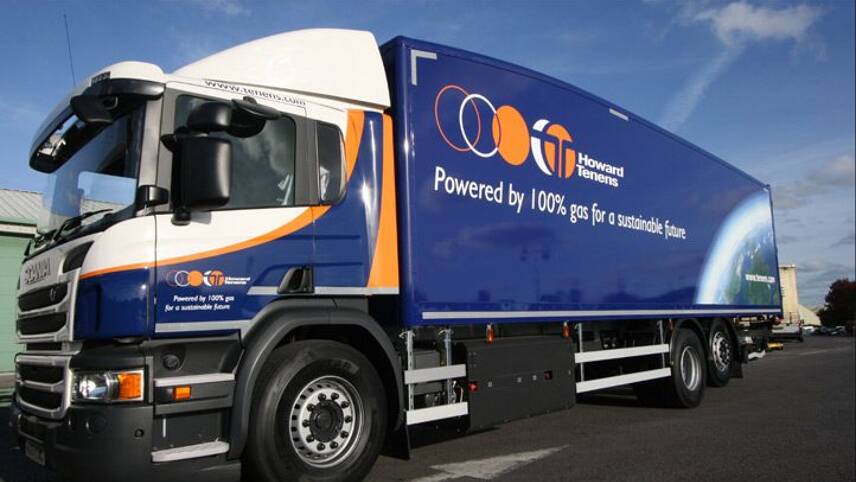Register for free and continue reading
Join our growing army of changemakers and get unlimited access to our premium content

The HGVs taking part in the trial ranged from 12 to 44 tonnes. Image: Cenex
Funded in part by the UK Government’s Office for Low-Emission Vehicles and its Innovate UK arm, the trial saw Asda, Howard Tenens and Kuehne + Nagel use biomethane to power 20 HGVs over 24 months. Each of the vehicles met the Euro VI standard for emissions.
During the trial period, this fleet of HGVs collectively travelled 2.2 million kilometres, emitting 1,400 tonnes less CO2e than a pure-diesel fleet of the same size travelling the same distance would have.
The trial notably saw participants use different biomethane blends to test their efficiency and particulate emissions. Results show that using a 25% biomethane blend would deliver a 17% annual carbon saving compared to diesel, while a 100% biomethane fuel would yield savings of at least 76%.
Findings on NOx, however, were less dramatic. The trial found that biomethane-powered HGVs emit similar levels of the pollutant to diesel-powered HGVs – but because the participating vehicles were Euro VI certified, these levels are broadly considered low. London’s ULEZ, for example, exempts Euro VI vehicles from charges.
Other firms which took part in the trial were consultancy Cenex; multinational biogas supplier Air Liquide; fleet telematics provider Microlise and data specialist Emissions Analytics.
Cenex believes that the findings of the trial prove that “fleet operators should seriously consider gas HGVs as a viable option in the immediate future”.
“This is an exciting time for the gas truck industry; after a decade of hard work, the UK is now in a position where there is a wide variety of OEM gas trucks and clean renewable biomethane available from public refuelling stations,” Cenex’s head of transport Steve Carroll said.
“This project proved the economic, environmental and operational case for gas trucks powered by biomethane. With around 80% well-to-wheel CO2 reduction from diesel, this proven technology can provide a significant in-road to meeting our net-zero targets, and Cenex now looks forward to assisting fleets in making the switch.”
Hitting the road
The publication of the trial’s findings come shortly after Air Liquide competitor CNG Fuels announced plans to become the UK’s first supplier of carbon-neutral fuel for HGVs – a feat it hopes to achieve by investing in hydrogen and biogas from manure.
CNG Fuels expects the manure-based biogas to go on sale in 2021.
The company supplies several high-profile UK corporates with biofuel, including John Lewis Partnership. The retail giant, which owns John Lewis & Partners and Waitrose & Partners, is aiming to convert its lorry fleet to be powered by biomethane within the next ten years, as it strives to become a net-zero business by 2050.
In a recent exclusive interview with edie, John Lewis & Partners’ director of corporate responsibility Benet Northcote said the retailer is succeeding in proving the business case for substantial low-carbon investments through its fleet work.
Sarah George


Since both sources of methane are purified to the same standard, and are chemically identical, it would alarming if differences were found.
With regard to mixing hydrogen and methane, it should be noted that volume for volume, hydrogen provides only one the energy of methane.
Hmmm
Richard Phillips